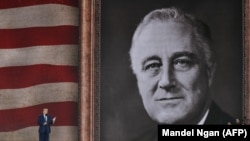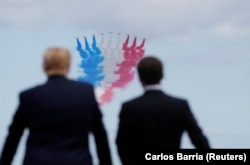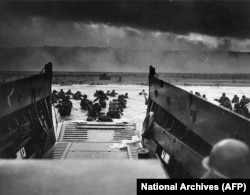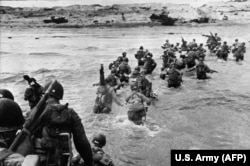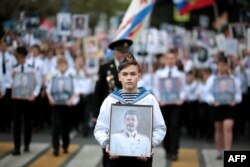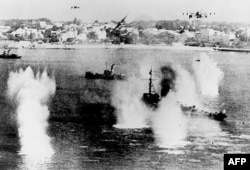On Thursday, June 6, commemorations were held marking the 75th anniversary of D-Day – the Allied invasion of German-occupied Normandy, France, during the Second World War.
Leaders of the Allied powers (including Canada, France, the United Kingdom and the United States), as well as German Chancellor Angela Merkel, took part in a ceremony marking the event.
Despite being on the Allied side from 1941-1945, Russian President Vladimir Putin was not invited to attend.
The previous day – June 5 -- Russian Foreign Ministry spokeswoman Maria Zakharova had downplayed the D-Day landing, saying it was not a “game-changer” for “the outcome of WWII and the Great Patriotic War” – the term used to describe the Soviet war effort on the eastern front against the Axis powers.
Zakharova said the outcome of the war was “determined by the Red Army’s victories,” mainly the battles of Stalingrad and Kursk, and added that the U.S. and U.K. had “dragged out” opening a second front.
What do historians say about these claims?
Opening a Second Front and ‘The Blood Price’
Michael Boire, an assistant professor at the Royal Military College of Canada who studies the details of combat preparations, told Polygraph.info the assessment that the U.K. and U.S. dragged out opening the second front “is nowhere in the documentation.”
He said “enormous preparations” were needed to shift the American war effort to the European theater, requiring a boost of industrial output that took years and depended on raw materials that arrived by convoy.
However, William Keylor, a professor of international relations at Boston University, said the Russians “are right in complaining about the long delay in the opening of the second front in Western Europe.”
“[Then British Prime Minister Winston] Churchill was the one who continually urged delay,” he said. “When the Americans landed in North Africa in the fall of 1942, which was an alternative to the second front in Europe. They then attacked Hitler's ally Italy, and the slog up the Italian boot took much longer than expected. Stalin reportedly assumed that the West's delays in opening the second front was motivated by anti-Communism. That is very doubtful. It was prompted by Churchill's (and to a certain extent FDR's) reluctance to commit to a cross-Channel invasion until the requested numbers of troops and amount of materiel had been transported to the U.K.”
David Glantz, a leading American military historian of the Soviet role in World War II, agreed that Churchill’s record vis-à-vis Bolshevism, specifically his alleged desire to “bleed” the Red Army while weakening the Wehrmacht, was not a contributing factor in that delay.
“In truth, however, the western Allies lacked the strength and will to mount cross-channel operations in 1942,” Glantz said. “Evidencing that fact was the failed landing at Dieppe, France, in August 1942, which clearly demonstrated that the Allies were not capable of launching a direct attack across the channel without disastrous casualties and significant risks. The course and cost of the 6 June Operation Overlord essentially justified that delay. Therefore, the Allies sought more limited second fronts in Greece and Italy to weaken Germany before cross-channel operations.”
Boire shares that view.
“The armed forces of the British and American armies were barely capable of beating the Germans,” he said. “How they burst through German defenses was through a willingness to pay the blood price. The U.K. could not pay the full price of that campaign because they were already bleeding in Southeast Asia (and beyond).”
D-Day “Game Changer?”
As for whether or not Normandy was a game changer, that term can mean “many things, although D-Day was definitely a game-changer on the Allied side,” Boire said.
“It changed the way we waged war; it contributed to the victory. “
Stephen Van Evera, a professor of political science at MIT, told Polygraph.info the Normandy landings “were one of the four great game-changer operations of World War II.”
“The others were the December 1941 defense of Moscow, and the 1942-43 defense of Stalingrad, and Kursk,” he said. “The Allied success at Normandy vastly increased the ability of the allies to put military pressure on Nazi Germany and markedly shortened the war.”
Keylor likewise said D-Day was a game changer in that “it resulted in the opening of a second front in Western Europe, which Stalin had been pressing for since 1942."
“It took some of the pressure off of the Red Army on the eastern front," he said, adding that the battles of Stalingrad and Kursk were definitely also game changers.
“Had {Kursk and Stalingrad] gone the other way, the war would have been prolonged many months and perhaps years," Keylor said.
Glantz shares the view that D-Day was a game-changer.
“Yes, it was a game-changer in the sense that the Allied (American, British, and Canadian) landings ultimately shortened the duration of the war by forcing Germany to shift forces from East to West and by distracting German attention from disasters looming in the East. It also bolstered the Soviet (Stalin’s) motivation to hasten the Red Army’s offensive operations,” he said.
However, Glantz also said D-Day was not the decisive factor it is portrayed as having been by U.S. observers.
“The Soviets had expelled Axis forces from much of Russia proper, destroyed the armies of almost all of Germany’s Axis allies (Italy, Romania, and Hungary) or forced them to withdraw from the war, begun the liberation of Poland and Romania, and were about to mount multiple successive offensives aimed at clearing German forces from Belarus and all German occupied territory east of the Vistula River in Poland and the Carpathian Mountains in Romania,” he said.
Ensuing Soviet offenses destroyed German army groups on the eastern front and inflicted more than 1 million casualties on the Wehrmacht, “propelling the Red Army’s forces westward,” Glantz said.
“Meanwhile, beginning on 25 July, the Allies broke out of the Normandy bridgehead, forcing a costly German withdrawal and seriously damaging Army Group B by mid-August, and driving German forces across the Seine River and through Paris by 25 August. These tit-for-tat offensives against Germany from East and West produced ‘chicken or egg’ arguments between the Allies regarding who did what to whom, when, and why. The net result, however, was that simultaneous offensives by American, British, and Canadian forces from the West and the Red Army’s forces from the East certainly hastened ultimate German defeat."
Rightful Resentment?
That said, according to Keylor, the Russian Foreign Ministry’s resentment towards “the hoopla devoted to the D-Day landings” is understandable, given the Soviet sacrifice during the war.
“The Russians lost millions of people in the war while the Americans and British were reluctant to take the pressure off. In the end, it was the Red Army that drove the Germans out of the then Soviet Union and Eastern Europe,” he said.
But Boire said that rather than being able to focus on a just cause, Putin has trouble recognizing “this Allied effort” due to domestic political concerns.
As for the alleged lack of Allied support, Glantz said that just as in the past, “the Russian Ministry of Foreign Affairs fails to mention sizable U.S., British, and Canadian aid to the Soviet Union and Red Army in the form of Lend-Lease.”
While he said the impact of Allied weapons’ deliveries is open to debate, the supply of other strategic materials and foodstuffs were vital to the Soviet war effort.
“Evidencing this fact is the ubiquitous presence of the words ‘Studebaker’, ‘Duglas’, ‘Kobry’, ‘Villis’, ‘Dodzh’, and ‘SPAM’ in the vocabulary of the Russians,” Glantz said.
Some Russian academics also hold that view.
Oleg Budnitsky, director of the International Center for the History and Sociology of World War II and Its Consequences at the Higher School of Economics, told the Russian government publication Russia Beyond the Headlines" that the supplies provided to Russia via Lend-Lease, adjusted to the 2003 exchange rate, amounted to $130 billion.
“The importance of economic cooperation with the U.S., UK and Canada cannot be overestimated,” he said.
“These supplies were critical in some key areas. For example, in the beginning of 1942, Western tanks fully replenished Soviet losses, and exceeded them by three times. About 15 percent of the aircraft used by Soviet air forces were supplied by Allies, including the P39 AirCobra fighter and the A20 ‘Boston’ bomber. The Allies supplied 15,000 state-of-the-art machines at that time; for example, famous Soviet ace Alexander Pokryshkin flew Air Cobra, as did the rest of his squadron. He shot down 59 enemy aircraft, and 48 of them were thanks to American military equipment.”
Thus, while matters of history are always open to debate, Polygraph.info finds that, based on the historical record, any claim that D-Day was not a “game changer” is false.




